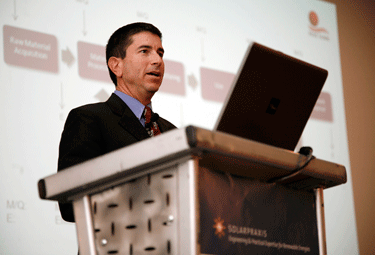In announcing his new appointments to the U.S. Manufacturing Council yesterday, Secretary of Commerce Gary Locke singled out the Council’s new leader, Bruce Sohn.
“With Bruce as chair,” said Locke, “we’re sending a message that President Obama and this Administration are committed to making renewable energy and efficiency technologies a cornerstone of a revitalized American manufacturing sector.”
Sohn is president of First Solar, the world’s largest manufacturer of thin-film solar PV, with headquarters in Tempe, Arizona. According to a Commerce Department spokesperson, Sohn is the first representative from the solar power industry to head the council, which advises the administration on competitiveness and other manufacturing issues facing U.S.-based companies.
Solar advocates, not surprisingly, enthusiastically endorsed the choice.
President and CEO of the Solar Energy Industries Association (SEIA), Rhone Resch, issued a statement saying that Sohn’s appointment “has told the world that the solar industry is becoming a backbone for our economy and offers a bright future for U.S. manufacturing.” (First Solar sits on SEIA’s board of directors.)
It’s not just the solar industry, however, that’s applauding the new leadership at the Manufacturing Council.
Jenny Powers, a spokesperson for that Natural Resources Defense Council (NRDC), said that by including Sohn the administration is acknowledging the fact that solar has a new relevancy in our energy future. “They [solar] are scaling up and playing with the big boys,” said Powers in a phone interview.
Sean Garren agrees. A clean energy advocate with the group Environment America, Garren said his organization is “looking forward to working with Mr. Sohn to reap all the manufacturing benefits we will see from the solar revolution in America.”
The U.S. has a lot of ground to make up.
A decade ago, 40 percent of all PV panels were made in the United States. That figure has dropped to less than 10 percent of the global supply today — a trend SEIA’s Resch thinks can be reversed in part by adopting smart manufacturing policies. One such example cited by Resch is the Advanced Energy Manufacturing Tax Credit program that provided $2.3 billion in credits to support U.S. manufacturers of clean energy equipment. The House has voted to refund the popular program; backers are still trying to get a similar bill through the Senate.
Other high tech manufacturers represented on the council include Freescale Semiconductor, Inc., GenMet, Ace Clearwater Enterprises, and Sacred Power Corporation, a Native American-owned business that deals in renewable and distributive energy.
First Solar has its corporate headquarters in Arizona, where, in 2009, the legislature passed its own groundbreaking legislation, providing tax credits to manufacturers of renewable energy equipment (SB 1403). When a Chinese-owned maker of PV panels announced it had decided that Arizona would be the home of the first Chinese PV assembly plant in the U.S., the incentives found in SB1403 were given as a primary factor in the choice.
First Solar manufactures thin-film PV at plants in Germany (approximately 700 workers), Malaysia (2,000 workers) and Perrysburg, Ohio (1,000 workers). The company plans on opening a new plant in France in the second half of 2011. Manufacturing jobs have followed demand and until recently, most orders for solar panels have come from Asia and Europe. But as demand for PV in the U.S. has jumped, First Solar has increased the size and production of its Ohio plant.

